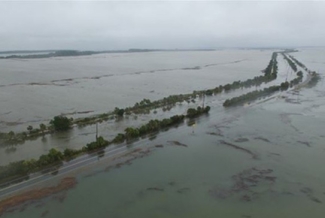From higher storm surge and more frequent flooding along the coast, to erratic weather patterns that affect the many industries connected to agriculture and forestry, the state of Georgia and its citizens face a growing array of challenges related to climate change. Now, a multi-disciplinary team of experts from across the state has developed the Georgia Climate Research Roadmap, a list of 40 key questions that can help Georgia’s policymakers and citizens better understand and address climate change.
The Research Roadmap, more than a year in the making and led by senior-level scientists from Emory University, Georgia Institute of Technology and the University of Georgia, was published in a new paper in the journal Environmental Management.
The Roadmap’s 40 questions focus on how climate change will impact Georgia and options for dealing with those impacts across themes such as water, the coast, agriculture, health, and energy. Several questions address issues related to equity and at-risk communities. An interactive version of the Roadmap is available at http://roadmap.GeorgiaClimateProject.org.
“By bringing these questions together in one place, we are trying to make it easier to identify high-impact research opportunities that will benefit decision-makers,” said Emory University’s Daniel Rochberg, a co-author of the paper. “The group that came together to produce the Roadmap is a great indicator of the expertise we have across the state on these issues.”
To develop the Roadmap, a team of 41 co-authors from academia, government, non-governmental organizations, and industry worked through a list of 180 candidate questions submitted by experts across the state through an online solicitation process. “To our knowledge, we are the first to use this novel research prioritization methodology on such a complex cross-cutting issue at the state level,” said co-author Marilyn Brown of the Georgia Institute of Technology.
“We see this as a really important first step,” said co-author Patricia Yager of the University of Georgia. “Now that we have outlined these questions, we hope to see researchers across the state digging into these in much more detail.”
An online portal will be updated with new information as it becomes available.
“The primary purpose is to assist officials at the local level and at state agencies who have to make decisions on the ground about projects and planning, and how they should take climate change into account,” Yager said. “They need information to make those decisions, so this portal is designed to give them effective, science-based information that reflects the results of a broad range of research, but also addresses the concerns of our coastal residents and communities, our farmers, private industry and municipalities of every scale.”
“This particular paper presents the questions and provides a starting point, and hopefully a model for other states, on how to get started with a conversation that is nonpartisan, non-political on how to get things moving,” said J. Marshall Shepherd, UGA Athletic Association Distinguished Professor of Geography and Atmospheric Sciences and co-author on the paper. “This is a research-question agenda that has emerged from the concerns of stakeholders around the state, one which will be focused on public engagement with workable solutions.”
Estimates suggest that sea levels will rise at least 3 feet by the end of the century, and coastal Georgia counties and cities are busy girding for the influx of that salt water.
Climate migration from sea-level rise could result in the millions of displaced residents from along coastal areas in the United States, and an influx of new residents to inland urban centers like Atlanta.
For the second consecutive year, Georgia has seen significant loss in its blueberry crops, with overall losses of both highbush and rabbiteye varieties possibly exceeding 60 percent, according to University of Georgia Extension. This follows the late spring freeze of 2017 that claimed 80 percent of south Georgia's blueberry crop. Estimated cost to the state for that loss was up to $400 million, an impact felt by farmers, sellers and consumers.
Unlike the 2017 freeze that hit the growing region March 15-16, after a mild winter, the 2018 losses are not directly attributed to one catastrophic freeze event, according to the Georgia Department of Agriculture.
“Communities across Georgia are already exploring strategies to respond to these challenges, and we need to be able to provide the information to make good decisions about infrastructure and planning that will best serve our citizens and protect the state,” Yager said.
Image: U.S. Highway 80, the only road access to Tybee Island off the Georgia coast, closed on the morning of October 27, 2015 due to flooding.

